10 Amazing Moringa Tea Benefits That Can Improve Your Well-being
Reap plenty of health rewards with moringa tea benefits. From boosting the immune system to improving skin, learn how moringa tea can enhance your well-being.
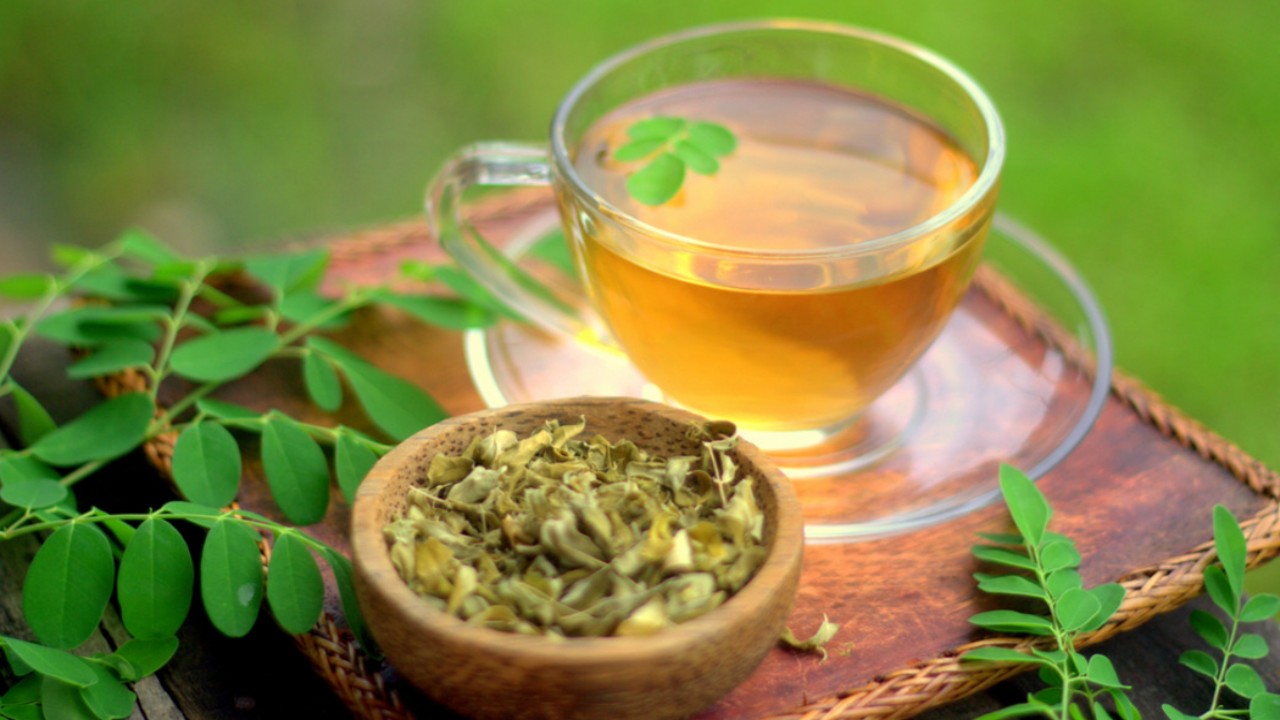
The world of natural wellness is here where age-old traditions blend seamlessly with modern understanding. It's time to unlock moringa tea benefits that give way to health and vitality by invigorating your body and mind. Don't think of moringa tea as a simple herbal infusion. There are tons of advantages. From skin radiance to immune fortification, rewards are many as you indulge yourself in the delightful taste of moringa tea.
So, it is a healthful and tasty treat along with benefits. Don't just sip it; savor it. Earthy tones, subtle sweetness, and aroma, all combine in a cup to enhance your senses. As a caffeine-free drink, you can have it thrice a day if you want (yes, you can have it in the morning, afternoon, or night). So, prepare to be amazed by what moringa tea can do for you.
What Is Moringa Tea?
Moringa tea is an elixir that originates from the leaves of the Moringa oleifera plant. Also known as the drumstick tree, this remarkable plant is a native gem of India. It is also cultivated in various tropical regions worldwide (1). Known for its high nutritional value, the leaves and seeds of this tree are packed with proteins, vitamins, minerals, and flavonoids.
The nutritious value of moringa leaves is genuinely impressive. Just one cup of chopped fresh leaves can provide you with a healthy dose of protein, essential vitamins like vitamin B6, and vitamin C, and a handful of other essential nutrients like iron and riboflavin (2). In places where nutritional deficiencies are a concern, moringa serves as an invaluable resource. Let’s take a closer look.
Moringa Nutritional Value
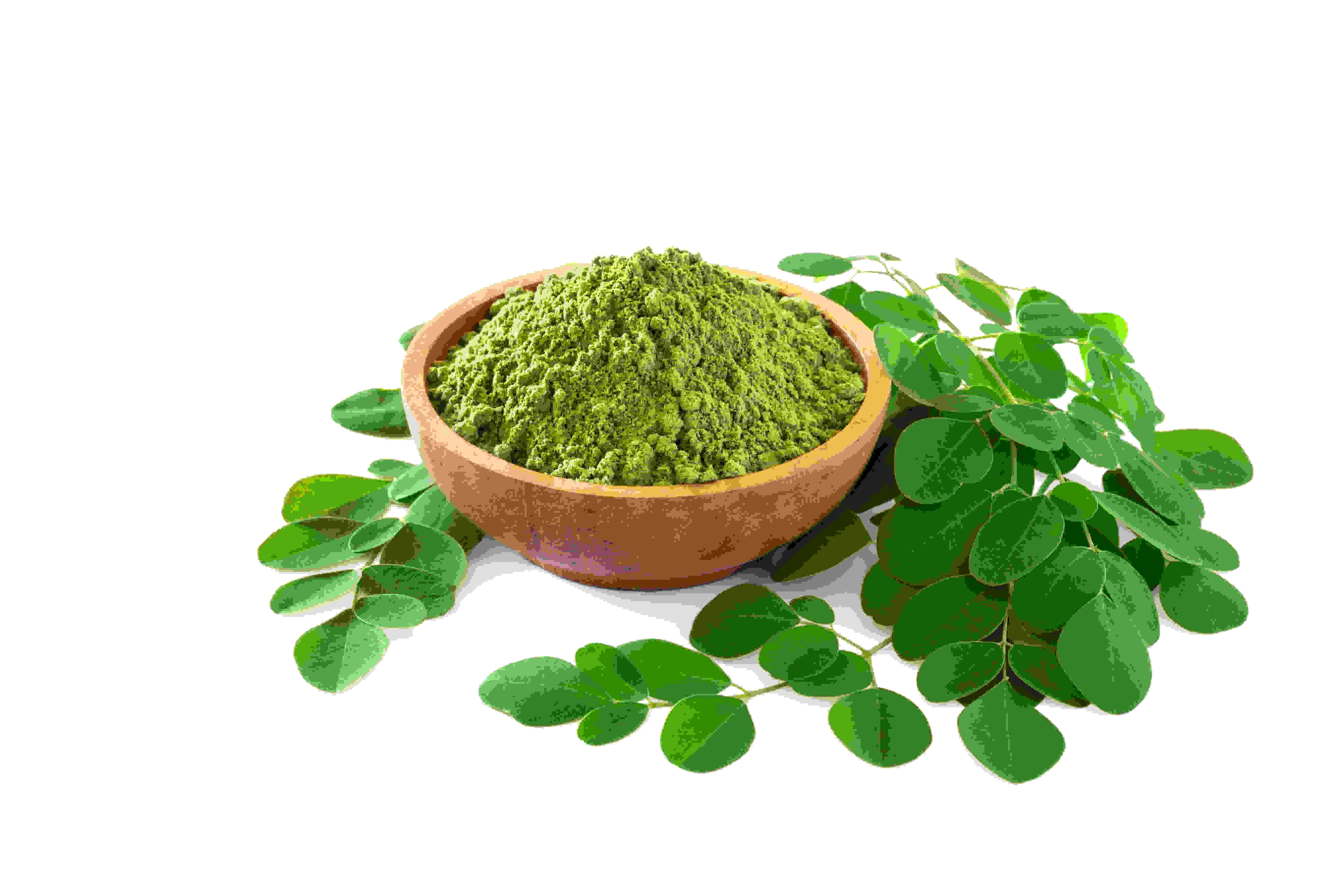
The abundance of vitamins in moringa is remarkable. It boasts sevenfold the vitamin C of oranges and tenfold the vitamin A of carrots. Surpassing staples, it delivers 17 times the calcium of milk and a whopping 25 times the iron found in spinach (2). Even the seeds of the moringa plant come with their own set of benefits, showing promise in areas ranging from antibacterial activity to water purification.
M. oleifera leaves are packed with essential nutrients and medicinal properties and are rich in amino acids and flavonols. Here is a breakdown of the compounds per 100 grams of the edible raw portion of the leaves (3).
Nutritional Value of Raw Moringa Leaves (Per 100 g)
- Tryptophan: 0.144 g
- Threonine: 0.411 g
- Isoleucine: 0.451 g
- Leucine: 0.791 g
- Lysine: 0.537 g
- Phenylalanine: 0.487 g
- Valine: 0.611 g
- Arginine: 0.532 g
- Alanine: 0.705 g
- Aspartic acid: 0.920 g
- Glutamic acid: 1.035 g
- Glycine: 0.517 g
- Quercetin: 16.6 mg
The nutritious power of moringa offers something for everyone. It's a gateway to a world of wellness.
How to Make Moringa Tea?
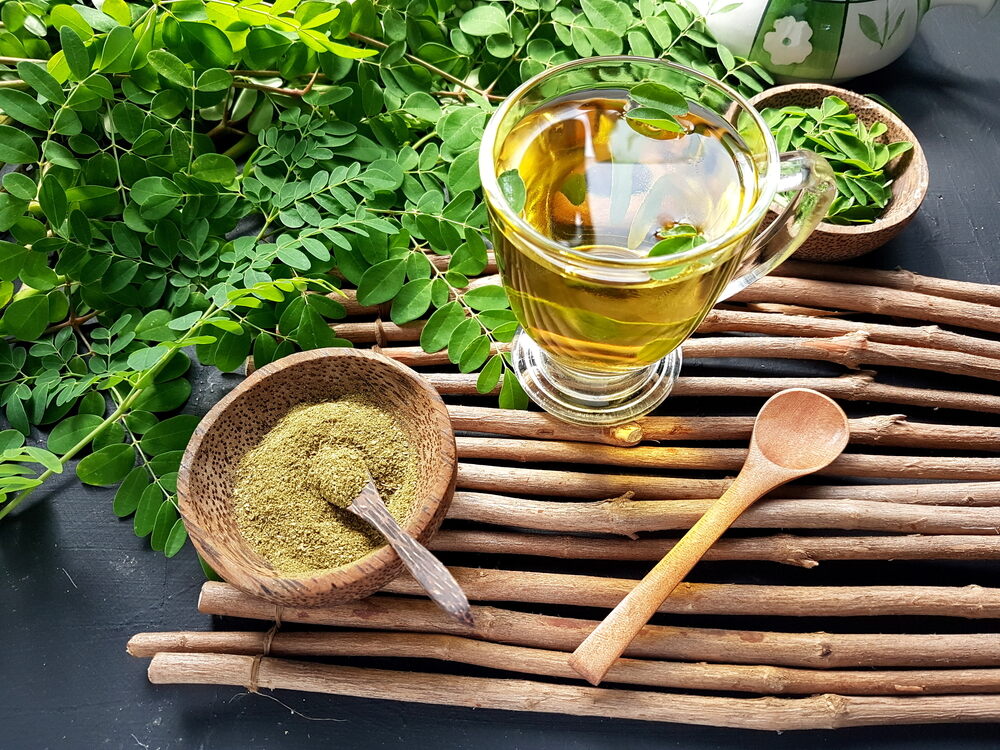
Making moringa tea is simple and fuss-free. Most commonly, the moringa tree leaves are used, but the flowers and seeds are also options. No worries about caffeine; all parts of the tree are naturally caffeine-free.
Here's what you'll need: dried moringa tea leaves and freshly boiled spring water.
Take one teaspoon of loose-leaf tea for one cup of water.
- Now, you have to steep the leaves in hot water for about 5 minutes,
- Strain and enjoy.
- Feel free to add a sweetener to suit your taste.
Pro-tip: You can also try mixing some green tea leaves with your moringa for a stimulating blend that will energize your day.
Top 10 Moringa Tea Benefits You Can Enjoy with Each Cup
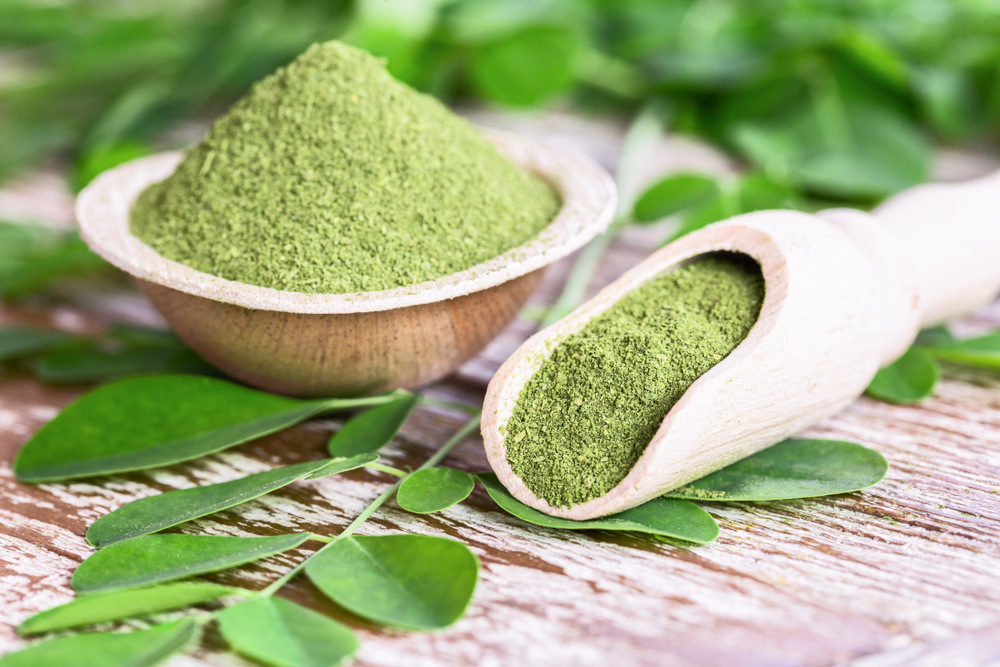
A tea so jam-packed with benefits, it's like your daily multivitamin but in a much more soothing form. Yes, we're talking about the incredible moringa tea health benefits. The herbal brew from the Moringa oleifera plant leaves offers a multitude of health advantages. Let's dive in.
1. May Improve Immunity
First up on our list is the potent antioxidant properties of moringa tea. With a staggering 46 different antioxidants, this tea is a powerhouse for your immune system and it can also keep your cells free from oxidative stress (1).
2. Provides Many Necessary Nutrients
Moringa is more than just a tea; it's a highly nutritious food source too. With its incredible nutrient density, it's no wonder why it's often termed as the "Miracle Tree." These leaves are a nutritional goldmine that can be harvested multiple times a year, making it a reliable source of nutrients worldwide (4).
3. May Prevent Infections
Moving on to its antimicrobial qualities, moringa tea showcases significant antibacterial activity. It fights a range of bacteria including harmful ones like Escherichia coli and Staphylococcus epidermidis. Moreover, it also offers antifungal and antiviral benefits (1).
4. May Help Prevent Inflammatory Diseases
Say goodbye to chronic inflammation with moringa tea. It has potential in the prevention of various inflammatory diseases. The anti-inflammatory properties aid the body in responding effectively to injuries and infections (4).
5. Reduces Blood Sugar
For those grappling with diabetes, moringa tea could be a boon. The leaves help in increasing insulin activity, reducing blood glucose levels, and improving glucose uptake. Additionally, it can help lower blood pressure and provide heart protection (4).
6. Helps Functionality of the Liver And Kidneys
Moringa has got your back in keeping your liver and kidney better. It plays a role in reducing damage to these organs, particularly when they are affected by medications. This protective action mainly stems from the leaves and flowers of the plant (5).
7. May Act as a Shield Against Cancer
Moringa tea holds promise in the area of cancer prevention. It has been studied for its effects on multiple types of cancer, including liver, pancreatic, and breast cancer, among others (6).
8. Helps Improve Eye Health
As studies suggest, vitamin A deficiency can lead to blindness and Moringa leaves and pods can prevent eye issues. Drumstick leaves aid vitamin A intake and delay cataracts. Moringa oleifera also shows the potential to protect the eyes from diabetes-related damage (7).
9. May Promote Weight Loss
Moringa leaves contain chlorogenic acid that helps in losing weight (8). So, for those suffering from obesity and looking for effective ways to manage their weight loss, moringa can be beneficial (9).
Our contributor Mary Sabat, RDN, LD, and Ace Certified Trainer, shares, “Moringa tea can be a beneficial addition to the diet of weight watchers due to its low-calorie content and potential appetite-suppressing properties. It is rich in nutrients and antioxidants, which can support overall health during weight loss. Moringa tea is generally safe for consumption by individuals of all age groups, as it provides essential vitamins and minerals. However, as with any supplement, there may be exceptions to this rule depending upon someone's specific health or medical concerns.”
10. May Help Manage Hypertension
The leaves of M. oleifera possess the potential to decrease both systolic and diastolic blood pressure. Thus, Moringa leaves can serve as a natural approach to blood pressure management and may be considered an alternative therapy (10).
There you have it — the list of the most prominent Moringa tea benefits. Apart from these, the plant has its use as a traditional medicine for treating various health issues such as heart diseases, skin diseases, anemia, dental infections, ear infections, blood sugar, hypertension, and cancer (6). From its unparalleled antioxidant activity to its potential in cancer prevention, each sip promises a step towards a healthier you.
According to Bella Carvosso, a Biomedical Scientist and Nutritionist, “Moringa tea offers skin benefits due to its high antioxidant content, such as vitamin C, beta-carotene, and quercetin. These antioxidants help combat free radicals, reducing oxidative stress that contributes to skin aging. Moringa tea's anti-inflammatory properties might alleviate skin conditions like acne, eczema, or psoriasis. However, scientific evidence on moringa tea specifically for skin health is limited. Incorporating it as part of a balanced skincare routine, alongside consulting a dermatologist, may provide potential benefits, but individual responses can vary.”
However, while moringa tea extract is celebrated for its array of health benefits, it's crucial to be aware of its limitations and potential side effects.
Side Effects of Moringa Tea
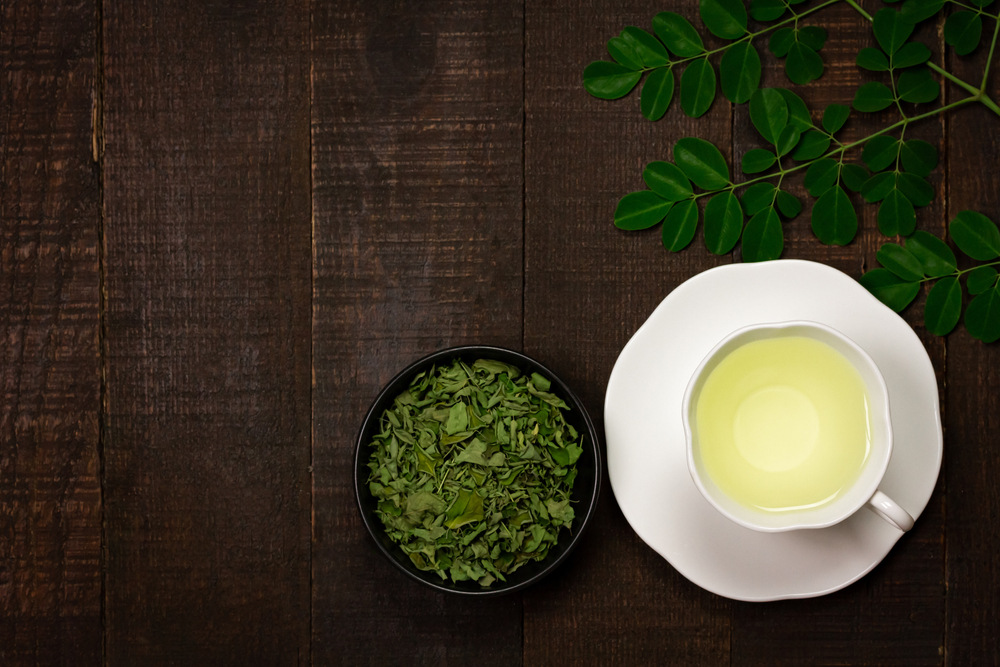
As the saying goes, too much of a good thing can be bad. Let's explore the other side of this wonder herb so we can enjoy its benefits responsibly.
- When consumed orally: Moringa leaf powder, fruits, and seeds are generally safe when consumed as part of a balanced diet. However, when using them for medicinal purposes, caution is advised. Products made from moringa leaves have been used safely for up to 6 months, while those from moringa seeds are usually safe for up to 3 weeks.
- Root and Root Bark Concerns: Although the leaves and seeds are commonly used, it's essential to avoid moringa root and root bark. These parts of the plant are possibly unsafe due to the toxic substances they contain. So, be certain to drink moringa tea that contains only the leaves.
- Overconsumption: Having moringa tea is good when taken in moderation. Too much moringa tea may lead to nausea and other health issues (3).
There's no doubt that moringa tea has exceptional health benefits. However, having an awareness of its potential side effects is also important. Our reviewer Bella Carvosso says, “ As with any supplement or herbal product, it's recommended to follow usage guidelines and consult with a healthcare professional, especially if using them for an extended period. Typically, moringa leaf powder or tea can be consumed regularly in moderate amounts as a part of a balanced diet. However, excessive intake might lead to adverse effects due to high concentrations of certain compounds. For safety, it's advisable to adhere to recommended doses and take breaks periodically. Pregnant or nursing women and individuals with specific health conditions should consult a healthcare provider before prolonged use.”
So here we are, at the end of this list of a comparative study of what Moringa tea can do. Moringa tea benefits have given us plenty to think about. From its ability to boost your immune system to its potential to beautify your skin and hair, its delicate flavor and caffeine-free nature make it a versatile addition to your day. But it's not just about what this herbal marvel can do for you today. Think long-term. With its nutritional profile, it's like adding a multivitamin to your daily routine, only in the form of a delightful cup of tea. There's a lot packed into those small leaves, and all it takes to unlock these healthful secrets is a kettle and a few quiet moments to enjoy.
And so, we've brewed, sipped, and learned together. We hope this has been as enriching for you as a cup of freshly made moringa tea itself. So why wait? The next cup could be a delightful and conscious step toward a healthier, happier you.
Contributor: Mary Sabat, RDN, LD, Ace Certified Trainer - Body Designs Ltd.





 JOIN OUR WHATSAPP CHANNEL
JOIN OUR WHATSAPP CHANNEL














































